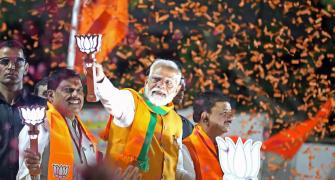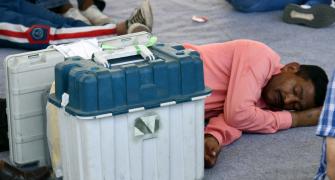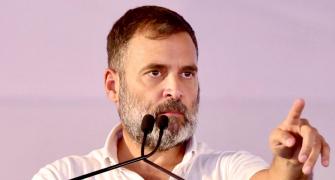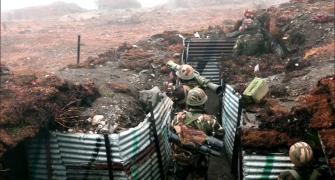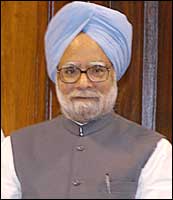 Faced with stiff opposition from Left parties -- allies of the Congress-led United Progressive Alliance government -- on the issue of labour reforms and divestment, Prime Minister Manmohan Singh has said that 'extreme rigidities' of the labour market have affected India's economic growth potential but limitations of the coalition government prevent him to carry out reforms in a 'big way.'
Faced with stiff opposition from Left parties -- allies of the Congress-led United Progressive Alliance government -- on the issue of labour reforms and divestment, Prime Minister Manmohan Singh has said that 'extreme rigidities' of the labour market have affected India's economic growth potential but limitations of the coalition government prevent him to carry out reforms in a 'big way.'
"Extreme rigidities in the labour market are not consistent with our plans of achieving goals in a world where demand and technological conditions are changing so fast," he told McKinsey Quarterly, a publication of the leading global management consultancy Mc Kinsey and Co, in an interview.
Asked about the constraint his government faces due to its coalition nature, he conceded that there are limitations "for the time being" and "we don't have the broad-based consensus in our coalition for me to assert that I can move forward in a big way" for reform in the labour market.
"But I do recognise that we should take credible action," he added.
Pointing out that the Communist government in West Bengal appreciates the need for labour market flexibility and is moving in the areas of privatisation also, the prime minister said the Left parties have to be convinced that what is good for West Bengal is also good for the country.
"I haven't given up hope. I have full confidence in the patriotism of our Left colleagues to believe that in the final analysis of what is good for India, they will also be on board," he added.
"We may be slow moving but if we build a consensus that would be far more durable than any other mechanism that I know of," the prime minister said.
He expressed confidence that when all things are considered "the reforms will have more broad-based support" and remarked that "a politician before he can become statesman has to remain in office for long enough."
The prime minister said he plans to identify areas where India needs a big thrust forward and set up a mechanism to bring about 'convergence' in what the state governments do and what the central government does so as to maintain a sustained and fast pace of development.
Identifying steel as one of the major sectors, he said the mechanism he is considering would comprise a group of 'dedicated officers' to work together to ensure that the country's three-tier system of government does not become a bottleneck in the development effort.
The prime minister, who fielded questions on a wide range of issues from poverty eradication to foreign investment, said his 'first and foremost priority' is to get rid of chronic poverty, ignorance and disease which have afflicted millions and millions of the people and thus 'finish the unfinished task' set out by the founding fathers at the time of Independence.
Singh agreed that India has a lot of backlog in improving infrastructure and said his estimates is that the country would need about $150 billion in next seven to eight years to realise the ambition of infrastructure improvement which is equal to the social and economic challenges that the country faces.
Stressing that the country has made 'great progress,' particularly in the last 20 years, the prime minister conceded that "we are not quite where we ought to be" and that next five to ten years are 'crucial' to stimulate the economic growth and to ensure that the accelerated growth benefits the poorest segment of the society.
Stating that the country needs a sustained growth of 7 to 8 per cent over next 10 to 15 years, the prime minister said, "We underpin that growth by strong performance of our agriculture, strong performance of our physical and social infrastructure."
Replying to a question, Singh emphasised that India needs a lot more foreign direct investment that it has got and "we should have ambition to move in the same league many other countries in our neighbourhood are moving."
"We may not be able to reach where the Chinese are today, but there is no reason why we should not think big about the role of foreign direct investment, particularly in the areas relating to infrastructure, where our needs for investment are very large. We need new initiatives, management skills, and I do believe that direct foreign investment can play a very important role," he said.
Talking about major initiatives that his government has taken for improvement of infrastructure, Singh told the Quarterly that he is not saying that everything is place. "But I think that in the last year that our government has been in office we have set in motion the processes through innovative public-private partnerships to explore new pathways to make the infrastructure ambitions a realisable goal," he said.
On reforms in the labour market, Singh said, "We cannot move straightaway to the Western or the American model of 'hire and fire,' quite frankly. I don't see that there is today a climate of opinion which will go to that extreme. We have to look at the Southeast Asian example, and probably the Japanese. The Japanese for a long period had a different labour-management system."
However, he pointed out that labour reforms would affect only 10 per cent of the labour force which is accounted for in the so-called organised sector. "Outside this 10 per cent, for the 90 per cent we are a completely flexible labour market. The normal laws of the market take precedence. Even within this organised sector, the problem is most acute in the public sector. In the private sector, most people tell me that they can find ways and means of working out voluntary agreements with the trade unions, whereby necessary labor flexibility can be introduced. In the public sector, we have rigid laws, and therefore there is this problem," he added.
Replying to a question, Singh said agri-business and food-processing are important parts of modernising the economy and agriculture, and moving into a phase where a more modernised agriculture helps not only farmers but also consumers.
"I've talked to a large number of producers -- people from Hindustan Lever Ltd and others and they've been telling me what India needs most is a unified food law. We have just now prepared the Bill, and it will be introduced in Parliament."
"The other thing to move forward on this front is that we must have electricity in our rural areas, we must have cold-storage facilities," he said.
Singh said the government has an ambitious plan to expand the availability of electricity to all villages. "I hope that should bring about a new revolution in the handling of agri-business."
With regard to entry of foreign enterprises in retail trade, he aid a package that is fair could be worked so that small shopkeepers are not hurt.
"We have to carry conviction with our political colleagues. But for the time being, I have my task cut out to carry conviction with our political colleagues that this is the way to move our economy to a higher growth path 'to create new employment opportunities' that this is not a strategy to hurt the small shopkeepers," he told the Quarterly.
Jobs, he said, have to be created in all sectors of the economy. "Agriculture still accounts for 60 per cent of our labour force. India will need a second Green Revolution to increase production and productivity, and in the process create more jobs."
"There are lots of people who tell me that services cannot move far ahead of what's happening in manufacturing, and that worries me -- this imbalance. I feel we have to do a lot more on manufacturing because, ultimately, services respond to what's happening in the production sector," he added.
Stressing that India must create a lot more jobs outside the agriculture sector, the prime minister said the system of general education and technical education should be in line with the job requirements.
"We have to walk on two legs. We have to create conditions in which manufacturing and services 'the economy outside agriculture' move and move fast enough. And at the same time the working force that is available must have skills which will it the kind of jobs which will be in demand," he told the interviewer, Rajat Gupta, past managing partner, McKinsey and Co.
Singh said it is his ambition to integrate the country into the evolving global economy. "We accept the logic of globalisation. We recognise that globalisation offers us enormous opportunities in the race to leapfrog in development processes. It also obliges us to set in motion processes which would minimise its risks," he added.



